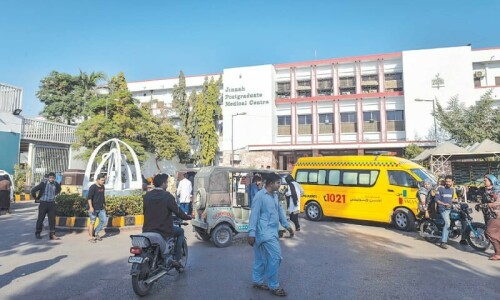KARACHI: On the occasion of the 177th Sindh Police Raising Day, Inspector General of Police Mushtaq Ahmed Mahar said on Friday that ever since its inception, the Sindh police had steadfastly faced all sorts of challenges under trying circumstances from dealing with the menace of terrorism to pandemics.
He said that over 2,300 policemen had been killed fighting against organised crime while over 70 were infected with Covid-19 while implementing the lockdown measures imposed by provincial government to halt the spread of coronavirus.
Recalling the ‘glorious past’ of the Sindh police as “being the first modern police force of the subcontinent”, he said: “Today, I have full confidence in its abilities and professionalism to upkeep its traditions and spirit of serving its community zealously even in the present pandemic.
“In the difficult times that we are living through, I am reminded of an earlier time when the Sindh police was again at the forefront of helping citizens to deal with a deadly epidemic.”
May 1 marks the 177th Sindh Police Raising Day
The IGP said that in 1890s, a terrible plague broke out across Sindh, and it was the police who were back then also at the forefront, helping to quarantine infected persons and even burying those who could not be buried by their families.
He said that the greatest quality of the Sindh police was that despite the very real dangers of infection that they faced every day and despite the fact that a number of policemen had been infected, the force still carried out its duties with the same degree of diligence every day, without faltering.
In his concluding remarks, the IGP hoped that the Sindh police would emerge from the pandemic as a truly trustworthy force dedicated to the safety and well-being of the people.
It may be recalled that when the deadly plague hit Karachi during the colonial era in 1890s, it triggered violence and displacement or emergence of new settlements in Karachi including present Civil Lines, according to historians.
There was not much information about the plague. However, Khan Bahadur Khudadad Khan, who had been declared as the ‘last historian’ of Sindh by Pir Hissamuddin Shah Rashidi and who had remained adviser of around 35 commissioners of Sindh starting from Frere for land and political affairs for 45 years, in his memoirs wrote that around 5,000 people died due to the plague.
However, Dr N.A. Baloch, quoting the memoirs of Hassan Ali Effendi, wrote that the plague had killed about 200,000 people as it was spread from Karachi to Shikarpur.
Published in Dawn, May 2nd, 2020













































Dear visitor, the comments section is undergoing an overhaul and will return soon.